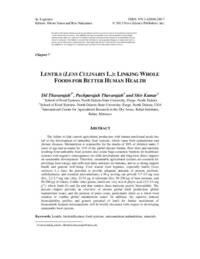Lentils (Lens Culinaris L.): Linking whole foods for better human health

Authors:
The failure to link current agricultural production with human nutritional needs has
led to the development of unhealthy food systems, which cause both malnutrition and
chronic diseases. Malnutrition is responsible for the deaths of 30% of children under 5
years of age and accounts for 11% of the global disease burden. Poor diets and nutrition
resulting from unhealthy food systems also create huge economic burdens for healthcare
systems with negative consequences on child development and long-term direct impacts
on sustainable development. Therefore, sustainable agricultural systems are essential for
providing food energy and sufficient daily nutrients for humans, and in so doing support
health and general well-being. Cool season food legumes, especially lentils (Lens
culinaris L.), have the potential to provide adequate amounts of protein, prebiotic
carbohydrates, and essential micronutrients; a 50 g serving can provide 3.7-4.5 mg iron
(Fe), 2.2-2.7 mg zinc (Zn), 22-34 μg of selenium (Se), 50-250 μg of beta-carotene, and
50-300 μg of folates. Unlike other grains, lentils are very low in phytic acid (2.5-4.4 mg
g-1), which binds Fe and Zn and thus renders these nutrients poorly bioavailable. The
present chapter provides an overview of current global lentil production, global
malnutrition issues, and the promise of pulse crops, particularly lentil, as a whole food
solution to combat global malnutrition issues. In addition, the superior mineral
bioavailability profiles and genetic potential of lentil for further enrichment of
bioavailable mineral micronutrients will be briefly discussed with respect to developing
sustainable food systems.
